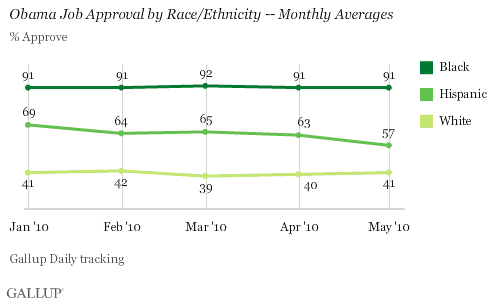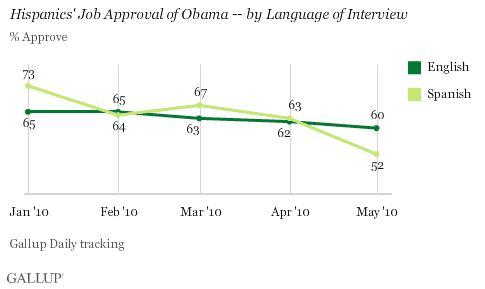PRINCETON, NJ -- Hispanics' approval of President Barack Obama's job performance slipped to 57% in May, after falling from 69% in January to 64% in February. By contrast, whites' and blacks' approval of the president has been steady throughout 2010.

These trend figures are based on monthly averages of ���۴�ýDaily tracking for 2010, including interviews with approximately 1,000 Hispanics each month.
Taking Reform Off the Table
The two major drops in Hispanics' approval of Obama this year -- in February and May -- coincide with two periods when the president was under fire for not doing enough to promote comprehensive immigration reform in Congress.
"The decline in Obama's approval rating with Hispanics is seen mainly among those interviewed in Spanish: an 11-point drop in the past month and a total of 21 points since January."
After Obama's State of the Union speech in January, several leading Hispanics and Hispanic groups criticized Obama for not devoting more attention to immigration reform in the speech -- and, more specifically, for not fulfilling his campaign promise of making comprehensive immigration reform a top priority. As one Hispanic activist wrote at the time, "For those looking for a strong statement in support of comprehensive immigration reform, the speech was a big disappointment." Illinois Rep. Luis Gutierrez was also publicly critical of Obama after the speech.
���۴�ýDaily tracking showed Obama's approval rating among Hispanics falling nearly 10 percentage points in the week after his State of the Union address compared to the week prior to the speech. And Obama's ratings remained subdued in February, resulting in the five-point drop in Hispanics' approval between the two months.
Obama also drew considerable ire from Hispanic groups -- as well as from New Jersey Sen. Robert Menendez -- after making statements at the end of April in which he essentially removed comprehensive immigration reform from his legislative agenda for 2010, citing political obstacles.
Again, there appeared to be an almost immediate impact: Obama's approval rating from Hispanics dropped seven points in the week after he made the statements, compared with the week prior to those statements. Publicity about Arizona's passage of a controversial immigration law around the same time may have only intensified Hispanics' desire to see quick action on comprehensive national reform legislation, thus keeping their approval rating of Obama below 60% throughout May.
Decline Steeper Among Spanish-Language Respondents
The decline in Obama's approval rating with Hispanics is seen mainly among those interviewed in Spanish: an 11-point drop in the past month and a total of 21 points since January. By contrast, his approval among Hispanics interviewed in English is down just 5 points since January.

About a third of Gallup's interviews with Hispanics are conducted in Spanish, accommodating respondents who are not proficient in English. Prior ���۴�ýresearch clearly shows that Hispanics interviewed in Spanish are much more likely to be immigrants to the U.S. than are those interviewed in English, supporting the idea that the immigration issue may be a factor in Hispanics' dwindling approval of the president.
Despite the widening gap in approval of Obama between Hispanics interviewed in Spanish and those interviewed in English, ���۴�ýfinds little difference in the trends on the basis of voter registration. His approval rating is down nine points since March among Hispanics who are registered to vote, as well as eight points among Hispanics who are not registered. While Hispanics' reduced support for Obama may or may not have a direct impact on their vote for Congress this fall, it could certainly make it harder for Obama to personally boost midterm turnout among Hispanics as part of the Democrats' get-out-the-vote initiative.
Bottom Line
Hispanics -- and particularly Hispanics who appear to be more closely associated with Hispanic immigrants -- have become increasingly disenchanted with President Obama this year. That said, it is important to note that in all instances a majority of Hispanics continue to say they approve of the president's job performance, exceeding approval among non-Hispanic whites. While Obama has tried to show strong moral support for the idea of comprehensive immigration reform, his reluctance to expend any real political capital to make it happen may be taking a toll on his approval rating in the Hispanic community.
Survey Methods
Results are based on telephone interviews with random samples of national adults, aged 18 and older, conducted Jan. 2-May 31, 2010, as part of ���۴�ýDaily tracking. For results based on the monthly samples of whites (approximately 12,000 each month), one can say with 95% confidence that the maximum margin of sampling error is ±1 percentage point. For results based on the monthly samples of blacks (approximately 950 each month), one can say with 95% confidence that the maximum margin of sampling error is ±4 percentage points. For results based on the monthly samples of Hispanics (approximately 1,000 each month), one can say with 95% confidence that the maximum margin of sampling error is ±4 percentage points.
Interviews are conducted with respondents on landline telephones and cellular phones, with interviews conducted in Spanish for respondents who are primarily Spanish-speaking. Each sample includes a minimum quota of 150 cell phone respondents and 850 landline respondents, with additional minimum quotas among landline respondents for gender within region. Landline respondents are chosen at random within each household on the basis of which member had the most recent birthday.
Samples are weighted by gender, age, race, Hispanic ethnicity, education, region, adults in the household, cell phone only status, cell phone mostly status and phone lines. Demographic weighting targets are based on the March 2009 Current Population Survey figures for the age 18+ non-institutionalized population living in U.S. telephone households. All reported margins of sampling error include the computed design effects for weighting and sample design.
In addition to sampling error, question wording and practical difficulties in conducting surveys can introduce error or bias into the findings of public opinion polls.
